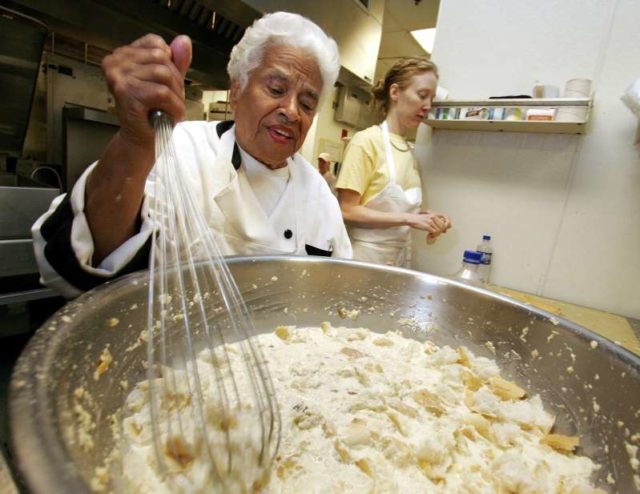Associated Press
NEW ORLEANS — Legendary New Orleans chef Leah Chase always had problems when customers asked if she served “soul food.” Well, that would depend on where your soul was, she’d say. If it was in China, she couldn’t really help you.
But if your soul was in New Orleans, well that was different.
“If your soul is in New Orleans, I know what to give you,” Chase said during an interview. “I’m going to give you some jambalaya. I can give you some stewed chicken. I can give you some shrimp Creole.”
Chase, who fed generations of New Orleanians and tourists alike at Dooky Chase’s restaurant, died Saturday. She was 96.
Chase’s family released a statement to news outlets Saturday night, sharing that the woman they called a “believer in the Spirit of New Orleans” died surrounded by family.
“Her daily joy was not simply cooking, but preparing meals to bring people together,” the family’s statement read. “One of her most prized contributions was advocating for the Civil Rights Movement through feeding those on the front lines of the struggle for human dignity.”
Leah Chase transformed the restaurant bearing — like her husband — her father-in-law’s name from a sandwich shop where black patrons could buy lottery tickets to a refined restaurant where tourists, athletes, musicians — and even presidents — of all races dined.
Chase’s determination propelled her from a girl with a small-town Louisiana upbringing to a celebrated chef who authored cookbooks, appeared on cooking shows and fed civil rights greats such as Thurgood Marshall and Martin Luther King Jr. Well into her 90s, Chase could be found every day at the restaurant, using a walker while greeting customers and supervising the kitchen.
“I love people and I love serving people. It’s fun for me to serve people. Because sometimes people will come in and they’re tired. And just a little plate of food will make people happy,” she said during a 2015 interview with The Associated Press .
At a time when other black Creole women were working in the city’s garment industry, Chase worked as a waitress in the French Quarter, which exposed her to the segregated city’s pricey restaurants frequented by white people.
When she married Dooky Chase in 1946, his family restaurant had been open for five years — largely under the guidance of his mother. But Leah Chase wanted to make it a fine dining experience for black patrons, along the lines of what she had seen in the Quarter. Gradually, she introduced silverware on the table, tablecloths and Creole dishes.
“I said well why we can’t have that for our people? Why we can’t have a nice space? So I started trying to do different things,” she said.
Dooky Chase’s became known as a place where white and black civil rights activists could meet and strategize about voter registration drives or legal cases. Although Chase and her husband were breaking the law by allowing whites and blacks to eat together, police never raided the restaurant.
She would also send food to jailed civil rights leaders, sniffing her nose at the notion of them eating prison food.
Sybil Morial, a longtime friend of Chase’s, said she’s eaten hundreds of meals at Dooky Chase’s where she was courted by her late husband and the city’s first black mayor, Ernest “Dutch” Morial. On visits to New Orleans, Thurgood Marshall and other lawyers would work with Morial’s husband and NAACP lawyer, A.P. Tureaud, and then head to Dooky’s for lunch or dinner.
“It was a haven for them to refresh themselves with wonderful gumbo and it was a place where they could strategize after a hard day’s work,” Morial said.
Chase never boasted about her works, saying simply that she did what she thought she had to do.
Hurricane Katrina in 2005 devastated her restaurant, where 5 feet (1.5 meters) of water lingered in the dining room for weeks. When the waters eventually receded, mold was everywhere.
Chase was already into her 80s, but there was little question regarding the restaurant’s fate. Having evacuated to Birmingham, she and her husband returned to live in a FEMA trailer next to the restaurant for months, while they rebuilt Dooky Chase’s.
She and her husband had been married for seven decades when he died in 2016.
Her food always reflected her city, a Creole mixture of Spanish, French, African and other cultures that have influenced New Orleans. She also enjoyed new culinary influences in the city, like the growing number of Vietnamese and Jamaican restaurants.
With the exception of two photographs of former President Barack Obama, the restaurant has little evidence of the celebrities and dignitaries who came to eat. Instead of surrounding herself with the past, Chase tended to look forward.
“I want to do better,” she said. “I want to have the finest restaurant with the finest food. That’s all I want.”





